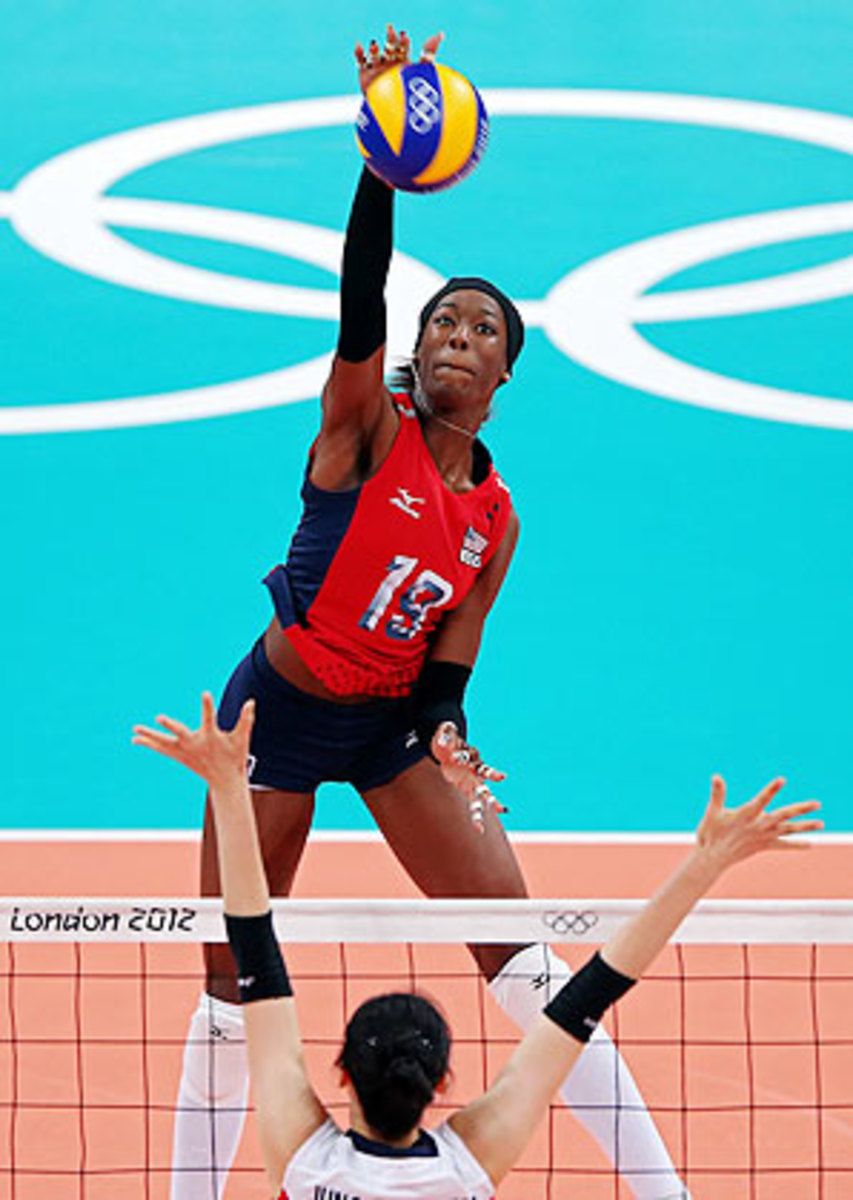Amid little fanfare, U.S. women's volleyball approaches history
LONDON -- These are the Games of the Girls. These are the Crying Games. These are the Team GB Games.
But these are also the Backstory Games.
The heroic quests of the athletes, their personal sagas, their vias dolorosa -- their "narratives," to use the inescapably voguish term -- have always, of course, been central to the Olympic tableau. But never more so than this year. Accelerated by NBC's various platforms and by social media, we've never known more about the athletes we're watching.
So it is that Jessica Ennis' status as a British populist heroine -- "So down to earth as to be subterranean," a London newspaper tells us -- was cemented when the public learned that her fiancée works on a construction site. Lolo Jones (as perhaps you've heard?) spent part of her childhood sleeping in an Iowa church basement, dreaming of her escape from endemic poverty. Gabby Douglas' mom filed for bankruptcy and has been admirably unashamed of it. ("It's my story, it's part of me. I'm not even embarrassed about it," she said the other day.) Ryan Lochte's parents are apparently in debt, too.
When the Olympic athletes and coaches are unfamiliar to so many -- when they play niche sports; when we don't have 82 or 162 games each year to get to know them -- it's important that the protagonists are "round characters," as the literature professor might put in. Athletes know the drill, too, often coming armed with stories. Only at the Olympics would the media, usually craving candor and personal material, accuse a subject of oversharing, still another of the shabby charges leveled against Jones.
It all makes Hugh McCutcheon particularly anomalous. By any measure, he, too, has a rich backstory. He went to the Beijing Olympics as the coach of the U.S. men's volleyball team. Before those Games began, though, he received the tragic news that his father-in-law, Todd Bachman (father of 2004 U.S. women's Olympic volleyball player Elisabeth Bachman McCutcheon, Hugh's wife) had been stabbed to death by a madman at Drum Tower, a 13th Century Beijing structure the ancient Chinese used for telling time. Todd Bachman's wife, Barbara, was stabbed as well; she was fortunate enough to survive after emergency surgery. (After the random attack, the deranged killer flung himself to his death.) The U.S. men's team, in part galvanized by their coach's trauma, went on the win gold. But it was adevastating trip for McCutcheon and his family.
Four years later, McCutcheon is back at the Olympics, this time as coach of the U.S. women's team. And while he understands the "backstory game," he'd just as soon opt out. "It's not really relevant," McCutcheon, a New Zealand native who played collegiately at BYU, says firmly when asked how his trauma in Beijing expresses itself. "I understand the media's interest. But it's not really part of our story, our journey." His players, too, say that it hasn't come up in conversation.
McCutcheon would prefer, instead, to talk about his team, which beat South Korean in straight sets today, 25-20, 25-22, 25-22. "It's about owning the moment, not letting the moment own you. And that's what we've done," says McCutcheon. "They know who they are. They know what they can do. They stand in there and execute."
The team's mix of veterans and youth has blended seamlessly. The three leading scorers, Destinee Hooker and Foluke Akinradewo are each first-time Olympians; Lindsey Berg, the center who sets them up so often, is on her third go-round. "We're a real quirky team, to tell you the truth, we all have different personalities," says Berg. "But when we come together, we mesh ... everyone helps out each other."
Hooker, a former All-America at Texas, was, in the manner of Michael Jordan, once cut from an AAU team. Here, she has emerged as the breakout star of these Games, an athletic dervish, responsible for a full third of the U.S. points. "She's incredible and has been incredible this whole Olympics," says Berg. "She makes the big-time swings and I know I can count on her."
Coach McCutcheon, a dead ringer for Jeff Bezos, deserves credit, too. "He's been spectacular," says Danielle Scott-Arruda. "He knows so much about the game but he also knows how to relay it to each player ... He's calm under fire and it sets the tone." Adds Christa Harmotto: "He has a great approach as far as keeping us confident and trusting us. ... He's big on making small plays and that's been a difference."
In the image of their soft-spoken coach, the entire team has garnered little attention here in London. Some of this is geographic. The volleyball events are being held on the opposite end of town from the Olympic Village. With its sand and bikinis, beach volleyball has siphoned some of the attention. And while Misty May-Treanor and Kerry Walsh Jennings played in a supercool central venue with various London landmarks as a backdrop, the indoor volleyball is being held in Earl's Court Exhibition Centre, a charm-deprived arena built before World War II.
Here's what so many are missing: one of the more dominating teams in these London Games. Through seven matches, the Americans are not only undefeated but have surrendered just two sets. More important, on Saturday they will try to become the first U.S. women's team ever to take gold in the volleyball event
In all likelihood, Saturday will mark McCutcheon's last game as U.S. national team coach. Upon returning to the U.S., he takes over as the head women's coach at the University of Minnesota. He and his wife, a Minnesota native, have two small children; he is determined not to parent via Skype.
Coaching the U.S. men to gold in one Olympics; then coaching the U.S. women to gold in the next? As narratives go, you could do worse.






